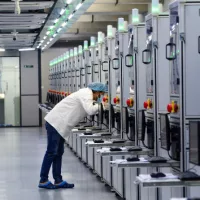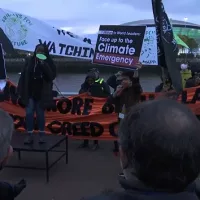(NEW YORK) — Silicon Valley Bank’s failure on Friday raises concerns over the potential impacts on the climate technology industry, where SVB was heavily involved.
“They went out of their way to attract entrepreneurs, to attract companies in the technology industry. They were one of the first banks to have a dedicated, clean energy sustainable finance department,” Mona Dajani, Global Head of Energy & Infrastructure at the law firm Shearman and Sterling, told ABC News. “They consciously developed this practice, and they were a well-known source — that’s where you could go because they were willing to lend to higher-risk, new companies.”
Silicon Valley Bank provided financing for over 1,550 clients working on climate technology and sustainability, according to its website. As of December 2021, SVB had committed $3.2 billion to such projects. The bank also claimed to have led or participated in 62% of community solar financings, as of last March.
Dajani said many of her clients banked with SVB and that “despite having their money restored” there is a feeling of skittishness after the failure of the bank.
Long-term, she said the failure of SVB could mean some smaller start-up climate technology companies could be cut off from credit lines if no other bank or entity takes on the SVB portfolio.
While larger “clean tech” companies will likely take their business to larger banks, Dajani said smaller companies and start-ups may have a harder time meeting what will likely be stricter standards for loans, possibly leading to a “slight chilling effect” in the industry.
Kiran Bhatraju, founder and CEO of Arcadia, a tech company focused on combating climate change, expressed concern over the downfall of SVB on Twitter Saturday, writing, “What’s missing from the narrative is SVB is a climate bank.”
“They were strong supporters [of] innovators in decarbonization and clean energy infrastructure – financing nearly 60%+ of the community solar market – alongside companies like Sunrun, Vivint, AES, and Bloom,” Bhatraju continued. “Arcadia is fine, and will be fine through this. But my hope for our industry and planet is someone makes sure funds continue to flow on Monday.”
In the aftermath of the bank’s failure, some Republican lawmakers have blamed its so-called “woke” policies, including ESG (Environmental, Social and Governance) and DEI (Diversity, Equity and Inclusion) for the downfall.
“A point that seems to be getting lost in the conversation around SVB is the failure of the San Francisco Fed to monitor the risks that were growing at Silicon Valley Bank,” Sen. Bill Hagerty, R-Tenn., a member of the Senate Banking, Housing and Urban Affairs Committee, tweeted Sunday night. “It is abundantly clear that SVB was terribly mismanaged. Their executives appeared to be more focused on diversity and ESG than managing their own risks. But why didn’t the SF Fed see this before it was too late? Was it because their CEO was on the board of directors of the SF Fed? Or were these regulators just asleep at the wheel? We need answers.”
Banks that utilize ESG policies consider those aspects when evaluating risk and opportunities, and many banks have some version of these policies in place, including Bank of America, JPMorgan, Wells Fargo and others.
While Silicon Valley Bank billed itself as a bank friendly to start-ups in the climate technology space, climate-related start-ups did not make up the bank’s whole portfolio. SVB had notable clients across a variety of business sectors, including finance technology, life science and health care, enterprise software and others.
Sunrun, one of the solar companies banking with SVB, released a statement detailing its exposure on Friday after the bank’s collapse.
“SVB represents a small percentage of our overall hedging facilities as measured by notional value of less than 15%,” Sunrun said in a statement.
Following the news that the FDIC would protect SVB depositors, Sunrun CEO Mary Powell provided additional comment to ABC News, saying, “We are pleased that the federal government acted Sunday to stabilize the banking system, ensuring us access to the less than $80 million we had in deposits at SVB.”
“Sunrun has long-standing banking relationships with a large number of financial institutions, and we remain confident in our ability to replace SVB’s undrawn commitments,” Powell continued. “Sunrun has always believed in strength through diversification.”
In January 2022, the bank announced a commitment to provide “at least $5 billion by 2027” in financing for sustainability efforts.
With SVB’s failure, that commitment, and a potential funding stream for climate tech projects is now void.
“The ones that are going to be hurt the most are the unsecured kind of start-ups,” Dajani said. “But I do feel that it will make the clean energy space as a whole come out stronger because they’ve learned from this and they’re trying to strengthen their foundation to avoid another collapse and look at other options for funding, for capital.”
Copyright © 2023, ABC Audio. All rights reserved.















